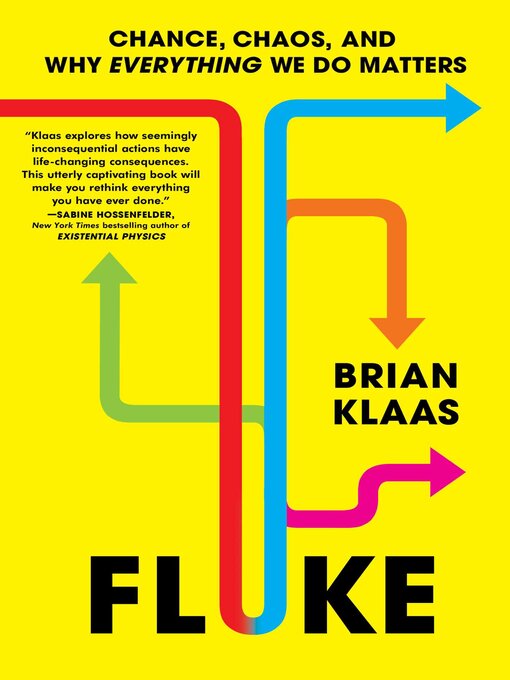- All Magazines
- Popular Magazines: Always Available
- Cooking and Food Magazines
- Craft Magazines
- News and Politics
- See all magazines collections
If you could rewind your life to the very beginning and then press play, would everything turn out the same? Or could making an accidental phone call or missing an exit off the highway change not just your life, but history itself?
In Fluke, myth-shattering social scientist Brian Klaas takes a deep-dive into the phenomenon of random chance and the chaos it can sow, taking aim at most people's neat and tidy version of reality. The book's argument is that we willfully ignore a bewildering truth: but for a few small changes, our lives—and our societies—could be radically different.
Offering an entirely new lens, Fluke explores how our world really works, driven by strange interactions and apparently random events. How did one couple's vacation cause 100,000 people to die? Does our decision to hit the snooze button in the morning radically alter the trajectory of our lives? And has the evolution of humans been inevitable, or are we simply the product of a series of freak accidents?
Drawing on social science, chaos theory, history, evolutionary biology, and philosophy, Klaas provides a brilliantly fresh look at why things happen—all while providing mind-bending lessons on how we can live smarter, be happier, and lead more fulfilling lives.
-
Creators
-
Publisher
-
Release date
January 23, 2024 -
Formats
-
Kindle Book
-
OverDrive Read
- ISBN: 9781668006542
-
EPUB ebook
- ISBN: 9781668006542
- File size: 7837 KB
-
-
Languages
- English
-
Reviews
-
Library Journal
-
Kirkus
February 1, 2024
In which the course of life becomes a series of dice rolls, each of no small consequence. The history of humankind, writes Atlantic contributor Klaas, "is just an endless, but futile, struggle to impose order, certainty, and rationality onto a world defined by disorder, chance, and chaos." Furthermore, our actions have consequences that can't always be foreseen. The author begins with the example of American statesman Henry Stimson, who stayed in a posh hotel in Kyoto, Japan, in the mid-1920s and 20 years later ordered that the city be spared from an atomic bombing, leaving Hiroshima and Nagasaki to take the blow. What might have happened had Stimson not stayed there? The world, he writes, "seems to seesaw between contingency and convergence." It is an infinite improbability that we are alive today, and yet here we are, thanks to an asteroid impact (and/or volcano eruptions) that incinerated the dinosaurs and ended the age of reptiles. Against all this, one should never be surprised when Nassim Nicholas Taleb's black swans come home to roost. "Our lives are frequently disrupted by large social shocks such as financial crises, pandemics, and wars," Klaas notes, and whenever we try to control the complex systems that drive them, we usually wind up on the losing side of the enterprise. Contingency rules, and, as the author sagely notes, we should congratulate ourselves less heartily for success and kick ourselves less savagely for failure. Yet in a world of chance, we still have an effect: "What you do matters. But it also matters that it's you, and not somebody else, who's doing it." The book can provoke existential unease, but it also helps explain the cockamamie nature of the way things are, and it's an always-interesting read. A handy user's manual to a surprising, improbable, "infinitely complex" world.COPYRIGHT(2024) Kirkus Reviews, ALL RIGHTS RESERVED.
-
Formats
- Kindle Book
- OverDrive Read
- EPUB ebook
subjects
Languages
- English
Loading
Why is availability limited?
×Availability can change throughout the month based on the library's budget. You can still place a hold on the title, and your hold will be automatically filled as soon as the title is available again.
The Kindle Book format for this title is not supported on:
×Read-along ebook
×The OverDrive Read format of this ebook has professional narration that plays while you read in your browser. Learn more here.


